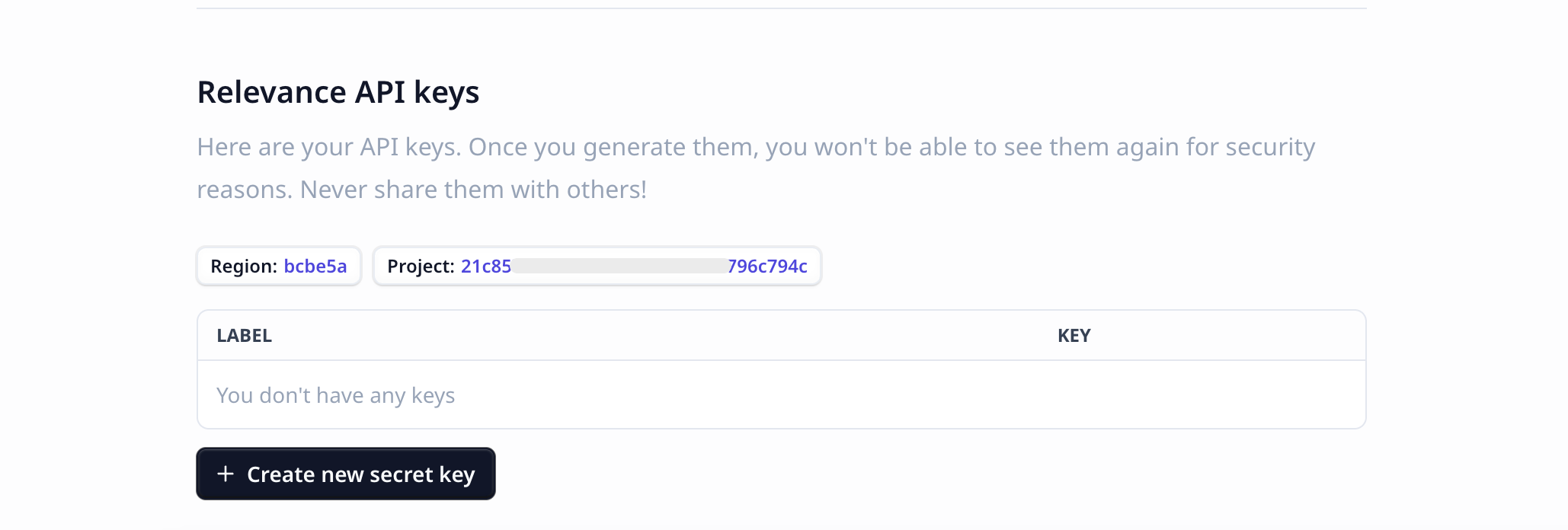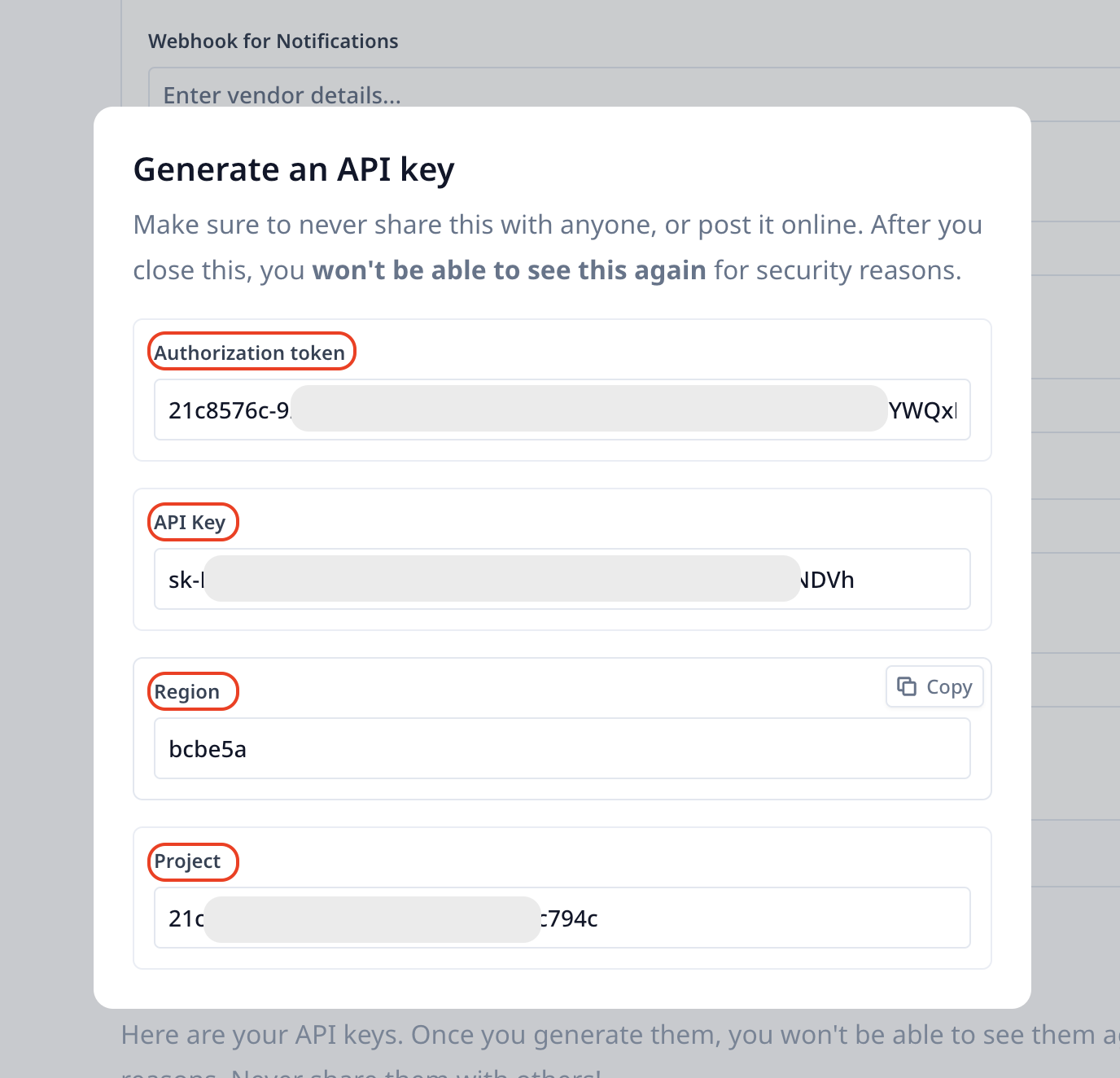Conversation with an Agent via and API call
How to make an API call to have a conversation with an Agent
This page explains all the required steps to successfully make an API call to your Agent.
Relevance Keys
When on API keys page, scroll down and you will see the Region code and your Project Id.

To generate your Relevance API key, click on "Create new secret key", with the role "Admin". Click on "Generate API key". Copy the values shown on the modal.
- Authorization token
- API key
- Region
- Project

Authorization tokens are formed under Project Id:API Key.
Agent Id
Currently, the easiest way to access Agent Ids is from URLs.
For instance, when on the "Edit agent" page, the last piece after project id and before /edit shows the Agent Id.
The URL is structured as
https://app.relevanceai.com/agents/REGION/Project-Id/Agent-Id/edit
Studio Id and Job Id
-
Step 1: Authorization Token
Either directly copy the
Authorization tokenfrom the API page (see above for instructions) or use theProject idandAPI keycombination as shown in the snippet below:authorization_token = f"{project_id}:{api_key}" # Both values can be found in the API Keys page -
Step 2: Region and Agent id
Fetch the values as instructed further up in this page
region = Region # Can be found in the API Keys page agent_id = Agent_id # Can be found in the Agent page URL -
Step3: Agent's studio and job ids
Run the Python snippets below with corresponding values for
Region,Authorization tokenandAgent Idon your project.import requests import json import time # Define the URL, authorization header, and the JSON payload url = f"https://api-{region}.stack.tryrelevance.com/latest/agents/trigger" headers = { "Authorization": authorization_token, "Content-Type": "application/json" } payload = {"message":{"role":"user","content":"Hello"},"agent_id":agent_id} # Convert the payload to a JSON string payload_json = json.dumps(payload) # Send the POST request response = requests.post(url, headers=headers, data=payload_json) # Check the response if response.status_code == 200: print("Request was successful!") print("Response:", response.text) else: print("Request failed with status code:", response.status_code) print("Response:", response.text)The endpoint to access an Agent's info:
https://api-{region}.stack.tryrelevance.com/latest/agents/trigger<region> can be found at API keys.
In a successful run, the output is a dictionary containing "studio_id" and "job_id" which are required for the next step (i.e
agent_details). We can access the corresponding values via the code below.agent_details = response.json()
Conversation with the Agent
To start a conversation with your Agent, provide the corresponding values for Region and Authorization token in the
code snippet below and that’s all :)
authorization_token = f"{project_id}:{api_key}" # Or copy directly from the API Keys page
region = Region # Can be found in the API Keys page
The endpoint to trigger a conversation with an agent:
https://api-{region}.stack.tryrelevance.com/latest/studios/{studio_id}/async_poll/{job_id}
See above for instructions to access <region>, <studio_id> and <job_id>.
# Replace these with the actual values obtained from the previous response
studio_id = agent_details["job_info"]["studio_id"]
job_id = agent_details["job_info"]["job_id"]
done = False
message = None
while True:
# Define the URL with placeholders for studio_id and job_id
url = f"https://api-{region}.stack.tryrelevance.com/latest/studios/{studio_id}/async_poll/{job_id}"
# Define the authorization header
headers = {
"Authorization": authorization_token
}
# Send the POST request
response = requests.get(url, headers=headers)
message = response.json()
for update in message['updates']:
if update['type'] == "chain-success":
done = True
if done == True:
break
time.sleep(1000)
List messages in a conversation
To list all the messages in a conversation, you can use the following code snippet. The messages will be reverse chronological order, i.e. the newest message will be the first in the list.
# Define the authorization header
headers = {
"Authorization": authorization_token
}
conversation_id = agent_details["conversation_id"]
# Define the URL with placeholders for studio_id and job_id
url = f"https://api-{region}.stack.tryrelevance.com/latest/knowledge/list"
payload = {
"knowledge_set": conversation_id,
"page_size": 20,
"sort": [
{
"insert_date_": "desc"
}
]
}
messages = requests.post(url, headers=headers, json=payload).json()['results']
The messages follow this general structure:
{
"data": {
"message": {
"role": "" // the type of message in the conversation history. e.g. "user", "agent", "action-request"
// ...other details dependent on the "role" above
}
}
}
Continue a conversation
To continue a conversation, you’ll need the conversation_id returned when you triggered the agent,
e.g. agent_details["conversation_id"] in the Conversation with the agent section above.
Then, you can trigger the agent as before, but with the conversation_id provided in the payload.
# ... previous code same as before
payload = {
"message": {
"role": "user",
"content": "Hello"
},
"agent_id": agent_id
"conversation_id": agent_details["conversation_id"]
}
# ... subsequent code same as before
You can then follow the
Confirm or reject a tool run
As above, you’ll need the conversation_id returned when you triggered the agent.
You’ll also need the action_request_id and action of the tool run that you want to confirm or reject.
You can find it using the api request here and it should
be the newest (first) message in your conversation.
# ... previous code same as before
action_request_message = message[0]['data']['message']
action = action_request_message['action']
action_request_id = action_request_message['action_request_id']
payload = {
"message": {
"role": "action-confirm", # or "action-reject"!
"action": action,
"action_request_id": action_request_id
},
"agent_id": agent_id
"conversation_id": agent_details["conversation_id"]
}
# ... previous code same as before
Was this page helpful?

